Amity, Oregon
Amity is a city in Yamhill County, Oregon, United States. As of the 2010 Census, the population was 1,614.[6]
Amity, Oregon | |
|---|---|
 Aerial view of Amity | |
| Motto(s): "Where Friendship Begins" | |
 Location in Oregon | |
| Coordinates: 45°6′59″N 123°12′20″W | |
| Country | United States |
| State | Oregon |
| County | Yamhill |
| Incorporated | 1880 |
| Government | |
| • Type | Mayor–council |
| • Mayor | Michael Cape |
| • City Attorney | Jerry Hart |
| • City Council | Walter Homen Rudy Van Soolen Karen Dahl Mina Hansen Katherine King Carmel Ball |
| Area | |
| • Total | 0.60 sq mi (1.56 km2) |
| • Land | 0.59 sq mi (1.54 km2) |
| • Water | 0.01 sq mi (0.02 km2) |
| Elevation | 162 ft (49.38 m) |
| Population | |
| • Total | 1,614 |
| • Estimate (2019)[3] | 1,724 |
| • Density | 2,907.25/sq mi (1,121.79/km2) |
| Time zone | UTC-8 (Pacific) |
| • Summer (DST) | UTC-7 (Pacific) |
| ZIP code | 97101 |
| Area code(s) | 503 |
| FIPS code | 41-02000[4] |
| GNIS feature ID | 1162813[5] |
| Website | https://www.cityofamityoregon.org/ |

History
The town was established between 1848 and 1849 by Joseph and Ahio S. Watt, two brothers who had immigrated to Oregon over the Oregon Trail.[7] Part of Joseph's land claim became the community's townsite.[7] The name "Amity" came from the name of a school that was built by two rival communities after the amicable settlement of a dispute.[8] Ahio, the first teacher, named the school.[8] Amity post office was established in 1852.[8] Joseph established the first woolen mill in Oregon, and in 1868 shipped wheat to England in the first instance of Oregon wheat being sent around Cape Horn.[7] The community was incorporated by the Oregon Legislative Assembly on October 19, 1880, originally as a town.[9]
Geography
According to the United States Census Bureau, the city has a total area of 0.61 square miles (1.58 km2), of which, 0.60 square miles (1.55 km2) is land and 0.01 square miles (0.03 km2) is water.[10]
Demographics
| Historical population | |||
|---|---|---|---|
| Census | Pop. | %± | |
| 1900 | 292 | — | |
| 1910 | 407 | 39.4% | |
| 1920 | 522 | 28.3% | |
| 1930 | 438 | −16.1% | |
| 1940 | 545 | 24.4% | |
| 1950 | 672 | 23.3% | |
| 1960 | 620 | −7.7% | |
| 1970 | 708 | 14.2% | |
| 1980 | 1,092 | 54.2% | |
| 1990 | 1,175 | 7.6% | |
| 2000 | 1,478 | 25.8% | |
| 2010 | 1,614 | 9.2% | |
| Est. 2019 | 1,724 | [3] | 6.8% |
| U.S. Decennial Census[11] | |||
2010 census
As of the census[2] of 2010, there were 1,614 people, 538 households, and 411 families living in the city. The population density was 2,690.0 inhabitants per square mile (1,038.6/km2). There were 574 housing units at an average density of 956.7 per square mile (369.4/km2). The racial makeup of the city was 83.9% White, 0.7% African American, 2.5% Native American, 0.4% Asian, 0.2% Pacific Islander, 8.6% from other races, and 3.7% from two or more races. Hispanic or Latino of any race were 15.5% of the population.
There were 538 households, of which 45.2% had children under the age of 18 living with them, 55.8% were married couples living together, 13.0% had a female householder with no husband present, 7.6% had a male householder with no wife present, and 23.6% were non-families. 17.1% of all households were made up of individuals, and 5.7% had someone living alone who was 65 years of age or older. The average household size was 3.00 and the average family size was 3.34.
The median age in the city was 31.9 years. 31.5% of residents were under the age of 18; 8.1% were between the ages of 18 and 24; 29.4% were from 25 to 44; 23% were from 45 to 64; and 8.1% were 65 years of age or older. The gender makeup of the city was 50.1% male and 49.9% female.
2000 census
As of the census[4] of 2000, there were 1,478 people, 471 households, and 373 families living in the city. The population density was 2,461.0 people per square mile (951.1/km2). There were 495 housing units at an average density of 824.2 per square mile (318.5/km2). The racial makeup of the city was 90.73% White, 0.14% African American, 1.42% Native American, 0.68% Asian, 0.07% Pacific Islander, 5.01% from other races, and 1.96% from two or more races. Hispanic or Latino of any race were 11.50% of the population.
There were 471 households, out of which 45.4% had children under the age of 18 living with them, 61.6% were married couples living together, 11.7% had a female householder with no husband present, and 20.6% were non-families. 15.9% of all households were made up of individuals, and 6.2% had someone living alone who was 65 years of age or older. The average household size was 3.14 and the average family size was 3.42.
In the city, the population was spread out, with 33.8% under the age of 18, 9.5% from 18 to 24, 29.4% from 25 to 44, 18.7% from 45 to 64, and 8.7% who were 65 years of age or older. The median age was 30 years. For every 100 females, there were 101.4 males. For every 100 females age 18 and over, there were 99.6 males.
The median income for a household in the city was $40,556, and the median income for a family was $42,375. Males had a median income of $30,417 versus $25,662 for females. The per capita income for the city was $13,563. About 8.7% of families and 9.6% of the population were below the poverty line, including 9.7% of those under age 18 and 17.5% of those age 65 or over.
See also
References
- "2019 U.S. Gazetteer Files". United States Census Bureau. Retrieved July 28, 2020.
- "U.S. Census website". United States Census Bureau. Retrieved 2012-12-21.
- "Population and Housing Unit Estimates". United States Census Bureau. May 24, 2020. Retrieved May 27, 2020.
- "U.S. Census website". United States Census Bureau. Retrieved 2008-01-31.
- "US Board on Geographic Names". United States Geological Survey. 2007-10-25. Retrieved 2008-01-31.
- American FactFinder - Results
- Corning, Howard M. Dictionary of Oregon History. Binfords & Mort Publishing, 1956.
- McArthur, Lewis A.; Lewis L. McArthur (2003) [1928]. Oregon Geographic Names (Seventh ed.). Portland, Oregon: Oregon Historical Society Press. p. 22. ISBN 0-87595-277-1.
- Whitney, J. R. (1905). "The Special Laws of the State of Oregon Enacted by The Twenty-third Legislative Assembly Regular Session". Salem, Oregon: State Printer: 829. Cite journal requires
|journal=(help) - "US Gazetteer files 2010". United States Census Bureau. Archived from the original on 2012-01-25. Retrieved 2012-12-21.
- "Census of Population and Housing". Census.gov. Retrieved June 4, 2015.
External links

- Entry for Amity in the Oregon Blue Book
- Engeman, Richard. "Amity". The Oregon Encyclopedia.
